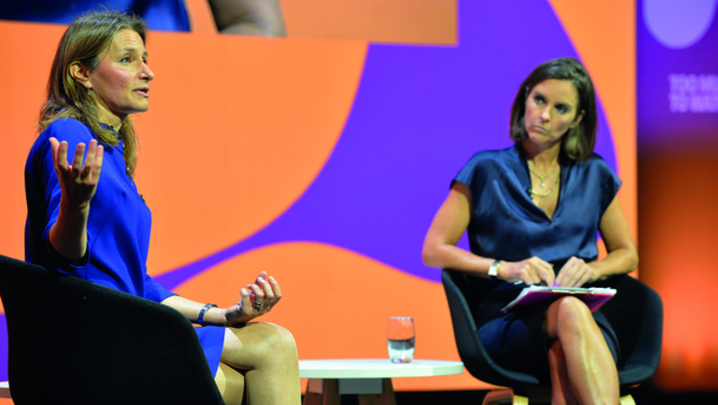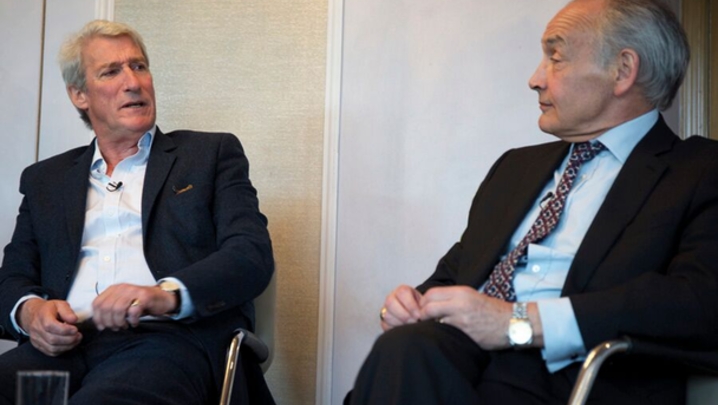New Culture Secretary Lisa Nandy is facing an overflowing in-tray. Manori Ravindran profiles an ambitious woman who grew up in the orbit of the media
Secretary of State for Culture, Media and Sport wasn’t exactly what the Manchester-born Shadow International Development Minister Lisa Nandy had in mind in the months leading up to July’s general election.
Nandy, 45, had counted on the international development brief —a natural extension of her work since September 2023. But there was a fly in the ointment: Shadow Culture Secretary Thangam Debbonaire, a cello-playing arts champion, lost her Bristol seat to the Green Party co-leader Carla Denyer, leaving the key role open.
“It wasn’t a great shock that Debbonaire lost her seat because all the polls suggested that, but I don’t think anyone had Nandy on the radar,” says one industry insider.
Nandy’s profile was highest as a Labour leadership candidate in 2020, coming third behind Rebecca Long-Bailey. Under Keir Starmer’s leadership, she then served for 18 months as Shadow Foreign Secretary, but subsequent jobs have been less senior. “She did seem a tiny bit marginalised,” says the source. “Now it’s a good thing she’s there.”
Certainly, Debbonaire, with her musical pedigree and experience as a performer was a natural choice. But on 5 July, as part of Starmer’s first Cabinet, it was Nandy who walked into No 10 for the first time in her 14-year political career, to be appointed Culture Secretary. One of her first major engagements with the TV industry will be as a speaker at the RTS London Convention this month.
In an interview with the podcast The Rest is Politics, Nandy recalled what Starmer told her at No 10: “I know you love the development brief, but I’m asking you to move because I need you to make an impact, and we need a legacy in this.”
The PM’s reasoning is prudent. Nandy is the 12th Culture Secretary in the last 10 years; the past Labour government cycled through just five culture secretaries between 1997 and 2010. As for the Conservative government’s legacy in the UK’s arts sector, a new report in July by the Campaign for the Arts lobby group and the University of Warwick revealed that the culture budget has dropped by 6% since 2010, when the Tories came to power. Elsewhere in Europe, Germany, France and Finland have grown their culture spend by up to 70%.
On the broadcasting front, the BBC bore the brunt of Conservative ire, with Culture Secretary Nadine Dorries in 2022 promising to abolish the licence fee when the corporation’s Royal Charter came up for renewal in 2027. Dorries froze the fee for two years, until March 2024, with an agreement to have annual inflation-linked increases from then until 2028.
However, in December, the Government raised the licence fee by just £10.50 (6.6%), a below-inflation rise that led to a £90m funding gap. It was the worst possible news for the BBC and the wider production sector, already crippled by the impact of two Hollywood strikes and the commissioning slowdown from commercial broadcasters battling an advertising downturn.
It is indisputable that Nandy has her work cut out. But while her previous shadow roles (Levelling Up and Foreign Secretary prior to International Development) didn’t engage directly with the cultural sector, her family life and upbringing puts her far closer to the TV industry than many of her predecessors.
Nandy was born and raised in Manchester. Her mother is ex-Granada TV journalist Luise Byers, the daughter of Liberal MP Frank Byers, and her father is Indian academic Dipak Nandy, a race-relations expert. The couple divorced when Nandy was seven and she was raised in a single-parent household by her mother. Byers went on to marry the late, great investigative RTS-award-winning journalist Ray Fitzwalter, who was editor of Granada’s influential World in Action programme for many years. He died in 2016.
“That did shape me a lot, especially with the attitude of the Tory government at the time towards single mums,” said Nandy on The Rest is Politics. “It leaves a very deep impression on you because you feel you’re under attack from your own government.” She added that Byers “was the only woman in the current affairs department at Granada”.
Byers was head of news during the Hillsborough disaster, and Nandy recalls her mother making tough calls to deliver seminal coverage of the stadium crowd crush that claimed 97 lives. “That footage was everything,” she said. “It was decisive in helping [the Hillsborough justice campaign] to achieve what they achieved.”
Nandy’s father, Dipak, was born in Calcutta and studied at Leeds University under Marxist literary professor Arnold Kettle. She says the Kettles — of whom Martin Kettle is an associate editor at The Guardian — are like a “second family”. Dipak, a self-proclaimed Marxist, was among the creators of the Race Relations Act.
If growing up in the orbit of media has impacted Nandy’s principles, the industry now hopes those values will translate into policy. There’s every indication they might. When Nandy challenged Starmer for the Labour leadership, she wrote, as part of a column for the website LabourList, that if elected she would protect the licence fee and “not hold the BBC to ransom over appointments and funding”.
Four years later, the TV sector breathed a sigh of relief when in July Nandy told Radio 4’s Today programme: “I’m keen to ensure the BBC can continue to thrive into the future. I’ve traditionally been a big supporter of the licence fee, as has Keir Starmer.” The PM later confirmed this, noting that there will be “some more thought between now and [2027]” but that Labour is “committed to the BBC and we are committed to the licensing arrangements”.
Jane Featherstone, one of the UK’s leading drama producers and co-founder and Chief Creative Officer of Chernobyl and Eric producer Sister, told Television: “I like the pronouncements [Nandy’s] made in the last weeks already. She’s supporting the BBC, supporting the right things … and it’s critical that we root the DCMS in education, culture and youth opportunity because that’s where the shoots grow from.”
Nandy, says Featherstone, “understands the opportunity we have in this country to excel even more in the creative industries. We’re really, really good at this stuff and we have to continue to invest in it.”
The specifics of Labour’s BBC backing remain hazy. Any suggestion that Nandy might be soft on the BBC was dismissed by her prompt response in August to the corporation’s handling of the Huw Edwards scandal.
On the licence fee, John McVay, head of the trade association Pact, warns that Labour’s ability to support the BBC may be hamstrung by other, more pressing economic priorities. Labour is unlikely to duplicate Conservative tactics such as freezing the licence fee, says McVay, but it’s doubtful the corporation will receive an above-inflation increase, given that consumers are still feeling financially squeezed. “Right now, with the cost of living [crisis] and increasing child poverty, the idea that even Labour would say, ‘We’re going to give the BBC a massive above-inflation increase in the licence fee’ is going too far,” says McVay. “I just don’t see that happening.”
While questions continue about the appropriateness of the licence fee — it is, after all, a regressive tax that everyone has to pay at the same amount, regardless of their financial situation — former BBC executive Roger Mosey insists that it is “still the least worst way of doing it”.
“And that seems to be where Labour are,” he says.
Mosey, a former head of BBC Television News and the current Master of Selwyn College at Cambridge, is accustomed to hand-wringing over the corporation’s funding. “Every time [they say], ‘One last go of the licence fee, and then we’ll find a better way of funding.’ And it never quite works out.”
Many in the industry hope Nandy will also be supportive of the wider UK production sector. She begins her tenure during one of the most challenging periods the screen sector has faced in decades. A July survey by the union Bectu of more than 2,300 film and TV workers revealed that 52% weren’t working and 38% planned to leave the industry within five years.
Derek Drennan, Managing Director of Nest Productions, is lobbying the DCMS to consider a new tax break for unscripted productions that would build on existing tax credits for high-end TV drama and children’s programming, as well as the new 40% indie film credit. His campaign is quietly gaining traction. Once he reaches 1,000 signatures, he says he will write to Nandy.
As well-intentioned as Drennan’s proposal is (and it’s worth noting that Banijay UK boss and former BBC Two controller Patrick Holland has also called for an unscripted tax break), some say it is unwise to believe Nandy and the DCMS will have genie-like abilities to fix the creative sector overnight. “We’re not going to get any new tax credits,” says McVay. Chancellor Rachel Reeves is committed to the fiscal rules, he notes, “which means that if we hadn’t managed to get the film tax credit over the line in the spring budget, Labour wouldn’t have done it”.
McVay says Debbonaire admitted to him that she would have struggled to get it through under Labour. “The idea they’re going to start splashing cash on new tax credits is going to be a big ask right now, when they’ve got other big problems.”
In Manchester, on 31 July, Nandy convened a summit of 150 cultural organisations, including the BBC, Prime Video and Warner Bros. Discovery, to invite them to work with the DCMS to grow the economy. The UK creative industries alone are worth £125bn — more than life sciences, automotive manufacturing, aerospace and the oil and gas sectors combined. “I promise you that we will walk alongside you, we will have your back, and we will give voice to the country many of us have believed in all our lifetime but never quite yet seen,” said Nandy.
Still in the thick of her honeymoon period, the new Culture Secretary is saying all the right things and has all to play for. But as the creative sector addresses a range of challenges, the television industry may need to prepare itself for some tough answers.







